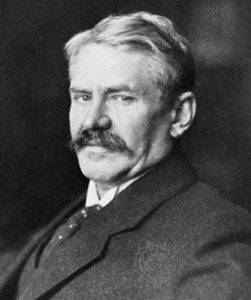Ernst Troeltsch facts for kids
Quick facts for kids
Ernst Troeltsch
|
|
|---|---|
 |
|
| Born | 17 February 1865 Haunstetten
|
| Died | 1 February 1923 Berlin, Germany
|
| Alma mater |
|
| Era | 19th-century philosophy |
| Region | Western philosophy |
| School | Neo-Kantianism (Baden school) History of religions school Liberal Christianity Classical liberalism |
| Notable students | Gertrud von Le Fort Friedrich Gogarten |
|
Main interests
|
|
|
Notable ideas
|
Crisis of Historicism Church, Sect, Mysticism |
|
Influences
|
|
|
Influenced
|
|
Ernst Peter Wilhelm Troeltsch (1865–1923) was an important German thinker. He was a Protestant theologian, which means he studied religion and God. He also wrote about the philosophy of religion, looking at big questions about faith. Troeltsch was interested in the philosophy of history, which explores how we understand the past. He was also a classical liberal politician, meaning he believed in individual freedom and limited government.
One of his most famous works is "The Social Teachings of the Christian Church" (1912). This book is still very important in the study of religion today.
Contents
Ernst Troeltsch's Life Story
Ernst Troeltsch was born on February 17, 1865. He grew up in a Lutheran family, but he went to a Catholic school. He later studied at the University of Erlangen and the University of Göttingen.
After finishing his studies, Troeltsch became a teacher. In 1891, he started teaching theology at the University of Göttingen. He then moved to the University of Bonn in 1892. Two years later, in 1894, he joined Heidelberg University. Finally, in 1915, he moved to the University of Berlin. There, he became a professor of philosophy and civilization. Ernst Troeltsch passed away on February 1, 1923.
Troeltsch's Ideas on Religion
Ernst Troeltsch often wrote about how society was changing. He believed these changes were challenging Christian religion. He talked about "the disenchantment of the world." This idea, from sociologist Max Weber, means that people were starting to rely less on magic and more on science to explain things.
Troeltsch also agreed with Weber's idea of the Protestant work ethic. This idea suggests that certain Protestant groups helped create capitalism. Capitalism is an economic system where businesses are owned by private individuals. Troeltsch believed that specific Protestant groups, not all of Protestantism, led to this.
However, Troeltsch was more hopeful than Weber. He thought that religious belief could lead to individualism. This means people focusing on their own thoughts and feelings. He also saw spiritual mysticism as a source of subjectivism, where personal experiences are very important. Troeltsch believed that non-Calvinist Protestantism positively influenced the press, modern education, and politics.
Religion's Role in History
Troeltsch wanted to explain why religion seemed to be less important in modern times. He looked at the history of European civilization. He divided it into three main periods:
- Ancient history
- Medieval history
- Modern history
Troeltsch had a different idea about when the modern period began. Many people thought it started with the rise of Protestantism. But Troeltsch argued that early Protestantism was actually a continuation of the medieval period. He believed the modern period started much later, in the 1600s.
He thought that the Renaissance in Italy and the scientific revolution planted the seeds for the modern age. According to Troeltsch, Protestantism actually delayed the start of the modern period. He saw early Protestantism as a change to Catholicism, not a completely new beginning.
Understanding History: Troeltsch's Principles
Troeltsch developed three important rules for studying history. These rules helped historians avoid their own biases. Biases are personal opinions that can affect how someone sees things. Troeltsch's principles aimed to make historical study more fair and accurate.
The Principle of Criticism
This principle states that there are no absolute truths in history. Troeltsch believed that judgments about the past can always be different. Because of this, we can't say something in history happened with 100% certainty. Instead, we can only say it was more likely or less likely to have happened. This means historians should never make a final, unchangeable claim about the past.
The Principle of Analogy
This rule helps historians avoid applying modern ideas to the past. This is called anachronism. Troeltsch said that to understand if something was likely to happen in the past, a historian's current situation shouldn't be too different from the past. He thought that human nature has stayed mostly the same over time. This rule helps historians be careful about how they tell stories about the past.
The Principle of Correlation
Troeltsch believed that all historical events are connected. He said that the actions of many individuals create historical events. This means that every event has a cause and leads to an effect. If something big happened, historians should assume it affected everything around it. Troeltsch thought it was important to include what happened before and after an event. This helps keep historical events in their proper time and place.
Troeltsch's Political Views
Ernst Troeltsch was a classical liberal in politics. This means he supported ideas like individual rights and freedoms. He was a member of the Parliament in the Grand Duchy of Baden, which was a part of Germany.
In 1918, he joined the German Democratic Party (DDP). Troeltsch strongly supported Germany's involvement in World War I. He famously said, "Yesterday we took up arms. Listen to the ethos that resounds in the splendour of heroism: To your weapons, To your weapons!"
See also
 In Spanish: Ernst Troeltsch para niños
In Spanish: Ernst Troeltsch para niños
 | Laphonza Butler |
 | Daisy Bates |
 | Elizabeth Piper Ensley |

